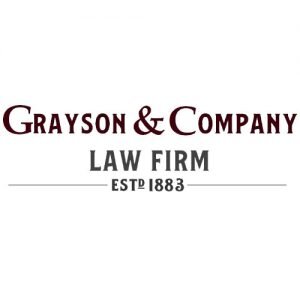Best Family Lawyers in Moose Jaw
Share your needs with us, get contacted by law firms.
Free. Takes 2 min.
Free Guide to Hiring a Family Lawyer
List of the best lawyers in Moose Jaw, Canada
Canada Family Legal Questions answered by Lawyers
Browse our 1 legal question about Family in Canada and read the lawyer answers, or ask your own questions for free.
- Hi there,I've been separated for 20yrs,would like to get divorced,
- What's the procedure, or legalities I'm facing, an how can you help?
-
Lawyer answer by mohammad mehdi ghanbari
Hello, Thank you for reaching out. I understand that navigating a divorce after a long period of separation can be a challenging and uncertain process, and I can offer some general guidance on the matter. General Divorce Procedure The first...
Read full answer
Canada Family Legal Articles
Browse our 1 legal article about Family in Canada written by expert lawyers.
- How to File for Divorce in Canada: A Step-by-Step Guide
- Family law in Canada covers separation, divorce, parenting, child support, spousal support, and property division, with rules split between federal law (Divorce Act) and provincial or territorial laws. You do not need a court order to separate, but you do need a court-issued divorce to legally end a marriage and... Read more →
About Family Law in Moose Jaw, Canada
Family law in Moose Jaw, Saskatchewan, is governed primarily by federal and provincial statutes. These laws deal with a wide range of family relationships, including marriage, divorce, common-law partnerships, child custody, child and spousal support, adoption, and child protection matters. Local courts, such as the Moose Jaw Provincial Court and the Court of King’s Bench, handle these cases. The focus of family law is to ensure that the rights and responsibilities of family members are protected and disputes are resolved as fairly and efficiently as possible.
Why You May Need a Lawyer
There are numerous situations in which you may require legal assistance in family matters:
- Divorce or separation, especially if children or significant property are involved
- Negotiating child custody, parenting arrangements, or visitation schedules
- Determining child or spousal support and enforcing support orders
- Adoption or guardianship proceedings
- Dealing with cases of domestic violence, protection orders, or restraining orders
- Settling property division following a relationship breakdown
- Drafting or reviewing cohabitation or prenuptial agreements
- Navigating child protection investigations
Local Laws Overview
Several key legal frameworks govern family law in Moose Jaw:
- The Divorce Act (Federal): Sets out rules for divorce, child support, custody, and access for married couples.
- Family Property Act (Saskatchewan): Governs the division of property between separating spouses or common-law partners.
- Children’s Law Act, 2020 (Saskatchewan): Covers parenting arrangements, decision-making responsibility, and contact with children.
- Maintenance Enforcement Act: Enforces child and spousal support payments.
- Child Protection legislation: Addresses the safety and wellbeing of children at risk.
- Provincial Family Law Rules and Court Proceedings: Set procedures for court filings, mediation, and dispute resolution.
Frequently Asked Questions
What is the process for getting a divorce in Moose Jaw?
To file for divorce, you typically must be legally married and have lived apart for at least one year. You must apply to the Court of King’s Bench, submit the appropriate documents, and resolve issues relating to children, support, and property either by agreement or court order.
How is child custody determined?
The court always prioritizes the best interests of the child, considering factors like the child’s needs, stability, and the ability of each parent to care for the child. Parenting arrangements may be made jointly, or one parent may have primary responsibility.
Am I entitled to spousal support?
Depending on the circumstances, such as length of the relationship, financial disparity, and the roles both parties played during the relationship, you may be entitled to seek spousal support after separation or divorce.
How is property divided after a separation?
In Saskatchewan, most property acquired during the relationship is subject to equal division unless there is a valid agreement (like a prenup) stating otherwise. Certain personal items and inheritances may be excluded.
What support is available for children?
Child support is determined using federal and provincial guidelines. The goal is to ensure that children continue to benefit financially from both parents after a separation.
Do common-law partners have the same legal rights as married spouses?
After living together for at least two years, common-law partners in Saskatchewan generally have many of the same legal rights and responsibilities as married couples regarding property division and child support.
How do I enforce a support order?
If your spouse or co-parent is not paying court-ordered support, you can register the order with the Saskatchewan Maintenance Enforcement Office. The office can take steps to collect unpaid amounts.
What are my options if I experience family violence?
You can apply for an emergency protection order, which may require the abusive person to leave the home or have no contact with you. Local resources and police can help ensure your safety.
Can family law matters be settled without going to court?
Yes, mediation and negotiation are strongly encouraged. Settlement without a court appearance can be less stressful and more cost-effective, but court remains an option when agreement cannot be reached.
Where do I start if I want to adopt a child?
The adoption process in Saskatchewan involves approval through the Ministry of Social Services or a licensed adoption agency. A lawyer can guide you through the paperwork, background checks, and court hearings required.
Additional Resources
Several resources can help people seek family law advice in Moose Jaw:
- Saskatchewan Legal Aid: Provides free or subsidized legal services for eligible low-income individuals.
- Family Law Information Centre: Offers general information, forms, and guidance on family law processes.
- Public Legal Education Association of Saskatchewan (PLEA): Publishes easy-to-understand guides and resources about family law issues.
- Saskatchewan Ministry of Justice: Oversees family law administration, including child support, maintenance enforcement, and protection orders.
- Saskatchewan Law Society Lawyer Referral Service: Connects the public with licensed lawyers for initial consultations.
- Moose Jaw Provincial and King’s Bench Courts: Where family law cases are heard and processed.
Next Steps
If you require legal assistance in a family law matter:
- Identify your main issues and gather any relevant documents (marriage certificate, financial statements, existing agreements, etc.).
- Consider visiting the Family Law Information Centre or PLEA for preliminary information and guidance.
- Determine if you qualify for free legal aid or need to hire a private lawyer. The Law Society referral service can help you find a qualified lawyer in Moose Jaw.
- Schedule a consultation to discuss your situation, possible outcomes, and what steps to take next.
- If you and the other party are willing, consider mediation or collaborative family law to resolve issues outside of court.
- Follow legal advice closely, keep records of all proceedings, and attend all required meetings or court dates.
Lawzana helps you find the best lawyers and law firms in Moose Jaw through a curated and pre-screened list of qualified legal professionals. Our platform offers rankings and detailed profiles of attorneys and law firms, allowing you to compare based on practice areas, including Family, experience, and client feedback.
Each profile includes a description of the firm's areas of practice, client reviews, team members and partners, year of establishment, spoken languages, office locations, contact information, social media presence, and any published articles or resources. Most firms on our platform speak English and are experienced in both local and international legal matters.
Get a quote from top-rated law firms in Moose Jaw, Canada — quickly, securely, and without unnecessary hassle.
Disclaimer:
The information provided on this page is for general informational purposes only and does not constitute legal advice. While we strive to ensure the accuracy and relevance of the content, legal information may change over time, and interpretations of the law can vary. You should always consult with a qualified legal professional for advice specific to your situation.
We disclaim all liability for actions taken or not taken based on the content of this page. If you believe any information is incorrect or outdated, please contact us, and we will review and update it where appropriate.
Browse family law firms by service in Moose Jaw, Canada
Moose Jaw, Canada Attorneys in related practice areas.









